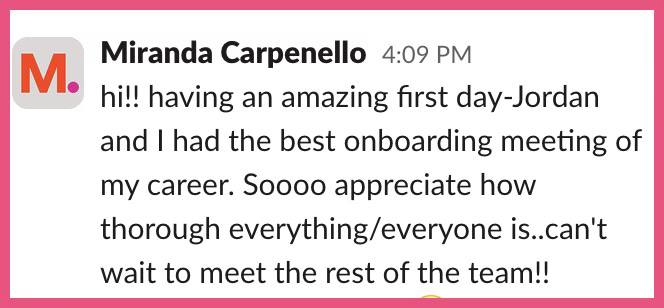The secret to success is usually less 'sexy' more 'stability'
The most important thing you can do for your business is create an ops manual
CHERRY ON TOP 🍒 is our monthly newsletter exploring the ins and outs of everything that modern businesses need to truly shine. We dive into topics that live at the intersection of our two companies – ORCHARD STREET, a venture studio + angel fund & DALY, a comms+ agency – as both help founders get the best ideas out into the world, through outstanding operations, comms, and culture-building.Alex: People love to talk about brand. The voice, the visuals, the viral moments. But the truth is, none of that sticks in a meaningful way, unless what’s inside the business matches the energy portrayed on the outside.
In this issue, Ally pulls back the curtain on one of Daly’s least glamorous (yet most impactful) pro-moves: creating an ops manual before we even had a team. What started as a simple, couple-page Google Doc has since become the quiet engine behind our consistency, our culture, and our growth.
If this all sounds like founder-only territory, think again. This one’s for anyone who wants to make their team stronger, culture clearer, and growth a little less chaotic.
Over to the ops queen herself, Ally!
Ally: People ask me about my job a lot.
They see the cool things my team is doing (largely thanks to how killer our website looks, and Alex’s newly revamped approach to LinkedIn posting) and want to understand how we’ve maintained such a consistent reputation and approach, even with the natural ebbs and flows of a business — employees leaving and joining; contracts starting and ending; the media (as our sister industry) morphing shape seemingly every couple of months.
I think that, by asking this, people are hoping to be clued into some magical secret formula that Alex and I have nailed, that can be replicated.
To their hopeful assumptions I often say: I have both bad and good news.
The bad news: the truth is way less secret & sexy than anything they’re imagining.
The good news: what we’ve done can, in a sense, be replicated!
The reality is: we’ve managed this consistency of excellence in large part because of a crucial decision Alex made back in 2019 (shout to our business consultant Holly for leading the charge on this!), and that we’ve built upon in the 6 years since — creating foundational operations documents before she even hired her first Daly employee.
I know, not quite a cool secret magic potion, but I’m here to make the case that the most important thing an early stage founder can do is to invest the time in creating their foundational company operations documents on Day 1. (This is actually the foundation of Orchard Street’s thesis, too!)
Founders often get caught up in things like product and vision (undoubtedly important) but overlook the less sexy foundational work that can set up your future company for stability and success. Founders need to ensure everyone that joins their team understands their vision, and is consistent in the way that vision is brought to life.
That’s where the two core foundational steps come in: creating an operations manual & establishing a consistent training plan.
If you’ve reached the end of this intro and are intrigued but also like “this is so niche,” I encourage you to keep reading anyway! These tools apply to way more than just founders (peek the “Cherry on Top” closer for more on that). The world is changing so rapidly every day, every minute even — you never know when a little niche knowledge is going to come in handy. ;)
~ ~ ~
PART 1: Operations Manual
What is it, how do you make it, and why
For the early stage companies we work with, we always recommend creating an Operations Manual at the very beginning of their journey. It may seem silly to build a robust document like this while you’re only a team of one or two people. After all, with yourself as your only employee, every action you take becomes the inherent “way you do things,” so codifying everything as you go can feel tedious, and superfluous.
But! Those early days are actually the best & most crucial time to create this type of foundational document — so that you can use it as a “north star” for how your values show up in your business, and how your team works and from Day 1, through Day 10,001.
But let’s back up. What is an Ops Manual?
A well-established Ops Manual should answer 90% of the questions anyone on your team might have about how the company operates. It should catalog everything from the miniscule to the big picture, and overall answer the question: how does your company work? How do you do things, and why?
Information around which software platforms & tools you use, and policies around how you use them? Definitely needs to be included.
A rundown of your culture practices & benefits, and how employees can access them? Add ‘em in there.
An emoji legend to catalogue your custom Slack emojis and what they mean? Sure!
The goal is for this one central document to keep everyone on the same page about everything — from how to draft a contract, to expectations for email response timing, to how to manage a tough client conversation, to how to give respectful peer-to-peer feedback. Having this on lock not only positively affects your team’s cohesiveness & productive output — it’s also a key aspect of establishing a sound company culture, especially in a remote work era!

A good Ops Manual should be an always-evolving, living document — on Day 1, you can start with the basics, adding and expanding as you figure things out, changing things as you find new ways to operate & grow. We’ve included a few screenshots of Daly’s own Ops Manual to give you a sense of what should be included. But this will be highly personalized to your org, and how you work!

Editor’s note: This is different from your Employee Handbook, which should entail all of the legal information tied to the state(s) you operate in. You definitely need this too—but it’s a bit more templatized and straightforward!
~ ~ ~
PART 2: A training plan that sticks
How much is too much, and who does it, and when?
And it’s not just about setting up those documents — it’s about actually using them. Which brings me to the next topic: training.
We consistently hear from our newly-onboarded employees that Daly has the most comprehensive and helpful onboarding process they’ve ever encountered. I think this is as much of a testament to how much thought we’ve put into our training process as it is a sign of how little effort other orgs put into their own new employee onboarding efforts.
Proper training should start on an employee’s first day. And ideally, training never really ends. We’re all always learning, after all! At Daly, we set up training and mentoring as:
A 2-3 hour onboarding session on the first day, led by your dedicated development manager (who remains your dev manager forever!)
Weekly check-ins with your dev manager, starting later in your first week
A 60-day review, for the dev manager + report to reflect on what’s working, what could use improvement, and goals for the months ahead
Quarterly check ins (more reflections, more goals, on a shorter 3-months scale)
An end of year annual reflection review (a deeper two-way evaluation and reflection on the year, and projecting goals for the year ahead)
This may seem like overkill if you’re coming from an org that *maybe* has one performance review per year, if anything — but setting up a regular cadence of check-ins helps get ahead of recurring issues, and provides a stable source of feedback, growth encouragement, and reflection for all levels of employees.

Having a manager & report spend a few hours together on training also has the added benefit of jump starting that crucial relationship — and setting up the foundational trust for future growth, feedback, and mentorship.
And what’s lucky is — since you already created your foundational operations manual, you’ve also therefore created a solid base for any manager to train any new employee on how things work at your company! Easy. :)
~ ~ ~
The Cherry on Top: You don’t have to be a founder or even in a leadership role to care about or get involved in this stuff! All levels and types of roles — across all types of industries — can benefit from pushing their organization to have better codified operations and training systems, including team managers, mentors, or even just ICs looking to have a more involved hand in evolving how their company works, and talks about how they work.








